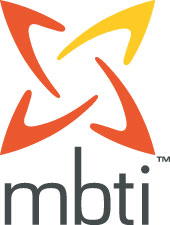If you’ve coached with me (and if you haven’t yet, why not?!), you know that the Myers-Briggs Type Indicator (MBTI), a psychological “test” that sorts people into 16 personality types, is central to my coaching and communications practice.
Knowing their MBTI type gives my clients insights about themselves, and helps me to coach them more effectively. Since the MBTI is taken by literally millions of people each year, a rich body of related literature and experience can shed light on things like how to develop your public speaking style, how you can best prepare and practice (this is not the same for everyone!), and why you may feel awkward or at odds in particular situations.
 Last week, my creative strategist, Melea Seward sent me a critique of the MBTI, and I did what any mature, professional would do: I sent back a snarky note saying that I don’t read those kinds of articles because they’re all wrong and stupid. An MBTI practitioner would take that as confirmation of my type, INFJ. In addition to our astounding virtues (compassion, empathy, courage, etc.), we INFJs can be a snarky, snap-judging, defensive, over-personalizing, grudge-holding, and sometimes binge-eating lot.
Last week, my creative strategist, Melea Seward sent me a critique of the MBTI, and I did what any mature, professional would do: I sent back a snarky note saying that I don’t read those kinds of articles because they’re all wrong and stupid. An MBTI practitioner would take that as confirmation of my type, INFJ. In addition to our astounding virtues (compassion, empathy, courage, etc.), we INFJs can be a snarky, snap-judging, defensive, over-personalizing, grudge-holding, and sometimes binge-eating lot.
I figure, you gotta love a system that can hold up that clear of a mirror to your strengths and foibles; but not everyone agrees with me. And not everyone has a good or clear MBTI experience because, oh, yeah, as with anything else, it all depends on how it’s handled.

The standard corporate way to administer the MBTI is to give you the test, give you the results, give you a cursory explanation of what they mean, lock you into an explanatory box or a folder in HR, and walk away. Feh! (as one of my friends likes to say). But that’s the common practice, and that’s why my clients who are about to take the MBTI often half-joke, “Is this test going to tell you who I am?” “No,” I say, “You’re going to tell me whether you identify with any of these 16 types, and this test is where we start that conversation.”
The MBTI is not a judgment, a prediction, or a magic trick. It’s a mirror that reflects things, not a box to lock people into. It’s a system — a very good one, but one in a long, long line of systems — that people have come up with to impose some order on the seemingly-chaotic and complex range of human personalities and potential.
I happen to find it an endlessly fascinating and useful system. That’s partly because I trained with the best. It’s partly because I’ve gained so much from the MBTI in my private life. And it’s mostly because this system let’s me bring tremendous benefits to my speaker coaching clients.
Would you like to see for yourself? If you’re interested in executive or life coaching from an MBTI Master Practitioner, I heartily recommend Natalie Shelpuk. And if you want to see how the MBTI can transform your relationship to public speaking and communications, I hope you’ll contact me.
